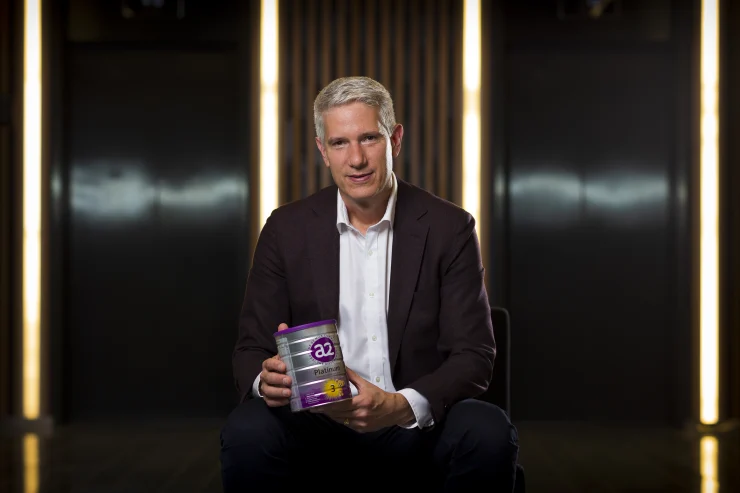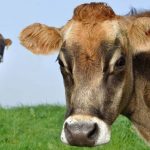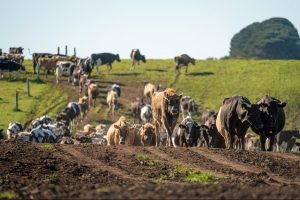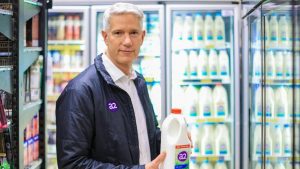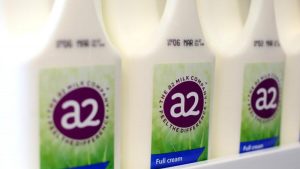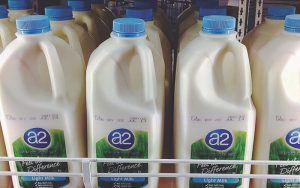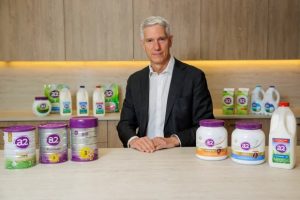
Then, to add insult to injury, when America ran into its infant formula crisis, A2 Milk was beaten by its much smaller rival Bubs Australia for fast-tracked access to the US market.
But borders have reopened, trading has resumed, and A2 Milk has rebuilt its business and increased China label sales – though its share price hasn’t returned to even half of its peak value.
While A2 Milk’s baby formula has remained popular with Chinese parents, can it win over Australian investors?
Industry: Food & beverage.
Main products: Fresh milk, milk powder, infant formula.
Key figures: Chief executive David Bortolussi, outgoing chair David Hearn.
How it started: New Zealand chemical engineer and research scientist Dr Corran McLachlan discovered a way to differentiate between cows that produced milk without the A1 protein, which can cause digestive discomfort for some drinkers.
The company was founded in 2002 by McLachlan and his business partner Howard Paterson to promote the benefits of A2 cows’ milk. A2 Milk listed on the ASX on March 31, 2015, at about $0.56.
How it’s going: The share price hit an all-time high of $19.83 in July 2020 when the company was firmly considered a market darling. Today, the share price is hovering just below $6, a 70 per cent loss of its value from its peak.
The early days of the pandemic appeared to be a boon for the company, but the worsening trade relationship between Beijing and Canberra, followed by Victoria’s lockdowns and border closures that choked daigou merchants, resulted in revenue downgrades.
The bull case: A2 Milk has engineered a solid turnaround since the pandemic disrupted the business, posting a 22.1 per cent jump in net profits to $68.5 million in the first half of the 2023 financial year. The company launched a successful marketing and distribution campaign to raise brand awareness that has lifted China label sales by 43.5 per cent, grown market share, and gained more customer loyalty.
“This bodes well for the long-term health of the A2 brand in China – A2’s key battleground and the vast majority of earnings,” wrote Morningstar equity analyst Angus Hewitt in a note.
A2 Milk also positions itself as a top-shelf product, which analysts see as working in the company’s favour as Chinese parents prefer high-quality products. Ultimately, this positioning also strengthens margins, noted Morgans senior analyst Belinda Moore.
“A2M has built a strong brand around the health benefits of its milk products that only contain the A2 beta casein protein type. Its premium products attract a premium price,” she wrote.
Morningstar’s Hewitt also believes the “premiumisation” trend will help A2 Milk capture market share and partially offset the falling birth rates. “Market share gains are supported by the strength of the A2 brand in China, which underpins the firm’s narrow economic moat,” he said.
“Despite intense competition from foreign and domestic competitors, A2 continues to gain share with top-tier pricing in the ultra-premium Chinese label segment.”
The bear case: Although A2 Milk’s market share in China is expanding, it’s against the backdrop of an overall dwindling market that shrank by 12.5 per cent in the first half of the 2023 financial year.
China’s birth rates have been in a steady decline and have fallen six years in a row. This wasn’t helped by the government’s strict lockdowns as part of its COVID-zero strategy; in 2022 alone, the birth rate dropped by 10 per cent. The trend is a key headwind for the infant formula, given nearly half of its overall revenue comes from China.
China’s infant formula market landscape also shifted significantly during COVID-19; A2 Milk faces greater competition from domestic players as Chinese citizens pivot towards local manufacturers amid a more rigorous infant formula standards and testing system.
The country has also recently installed new national mandatory standards for imported dairy products and infant formula that impose a burden on manufacturers such as A2 Milk. The dual-listed is still waiting for its registration to be officially approved and has been stocking inventory in the meantime.
“Timing is uncertain and subject to State Administration for Market Regulation (SAMR) approval. If this approval isn’t achieved, it would impact A2M’s China label infant formula sales ([roughly] 30 per cent of 2022 group sales),” Moore said.
Advice given in this article is general in nature and is not intended to influence readers’ decisions about investing or financial products. They should always seek their own professional advice that takes into account their own personal circumstances before making any financial decisions.
